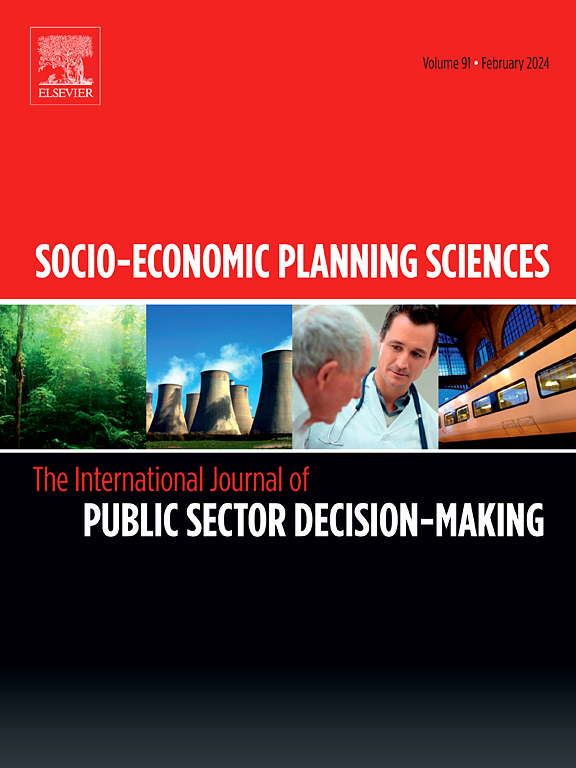医疗废物处置逆向物流网络风险缓解的多目标优化
IF 5.4
2区 经济学
Q1 ECONOMICS
引用次数: 0
摘要
鉴于医疗废物对环境和公众健康的严重危害,本文提出了一个多目标优化模型来解决其逆向物流网络的区位配置问题。我们设计了一个高效的医疗废物逆向物流网络,以配备焚烧-熔化技术的处理中心为特征,并建立了一个考虑传染风险、环境风险、社会风险和总成本的多目标优化模型,以解决所提出网络中的位置分配问题。为了支持决策者在没有先验偏好信息的情况下降低风险和成本,我们使用蒙特卡罗模拟来检查权重因素对模型结果的影响。然后将提出的方法应用于中国重庆的实际案例研究,以评估其适用性和有效性。仿真结果表明,所提出的网络中的医疗中心得到了有效的定位,医疗废物在不同场景下得到了合理的分配,实现了传染风险最小值320.5元,环境风险最小值8.6元,社会风险最小值198.5元,总成本为210,617.9元。此外,拟议的模式在减轻风险和降低成本之间取得平衡,在不产生过多成本的情况下尽量减少医疗废物管理风险,在不损害风险控制努力的情况下实现成本节约。本文章由计算机程序翻译,如有差异,请以英文原文为准。
Multi-objective optimization for risk mitigation of medical waste disposal reverse logistics network
Given the serious risks medical waste poses to the environment and public health, this paper proposes a multi-objective optimization model to address the location-allocation problem within its reverse logistics network. We design an efficient reverse logistics network for medical waste disposal, featuring treatment centers equipped with incineration-melting technology, and develop a multi-objective optimization model that considers infectious risk, environmental risk, social risk, and total costs to solve the location-allocation problem within the proposed network. To support risk mitigation and cost reduction for the decision maker without prior preference information, we use Monte Carlo simulation to examine the impact of weighting factors on the model's outcomes. The proposed methodology is then applied to a real-world case study in Chongqing, China, to evaluate its applicability and effectiveness. The simulation results demonstrate that the centers in the proposed network are effectively located and medical waste is appropriately allocated across various scenarios, achieving minimum values of 3120.5 for infectious risk, 8.6 for environmental risk, 198.5 for social risk, and 210,617.9 CNY for total costs. Furthermore, the proposed model strikes a balance between risk mitigation and cost reduction, minimizing medical waste management risks without incurring excessive costs and achieving cost savings without compromising risk control efforts.
求助全文
通过发布文献求助,成功后即可免费获取论文全文。
去求助
来源期刊

Socio-economic Planning Sciences
OPERATIONS RESEARCH & MANAGEMENT SCIENCE-
CiteScore
9.40
自引率
13.10%
发文量
294
审稿时长
58 days
期刊介绍:
Studies directed toward the more effective utilization of existing resources, e.g. mathematical programming models of health care delivery systems with relevance to more effective program design; systems analysis of fire outbreaks and its relevance to the location of fire stations; statistical analysis of the efficiency of a developing country economy or industry.
Studies relating to the interaction of various segments of society and technology, e.g. the effects of government health policies on the utilization and design of hospital facilities; the relationship between housing density and the demands on public transportation or other service facilities: patterns and implications of urban development and air or water pollution.
Studies devoted to the anticipations of and response to future needs for social, health and other human services, e.g. the relationship between industrial growth and the development of educational resources in affected areas; investigation of future demands for material and child health resources in a developing country; design of effective recycling in an urban setting.
 求助内容:
求助内容: 应助结果提醒方式:
应助结果提醒方式:


